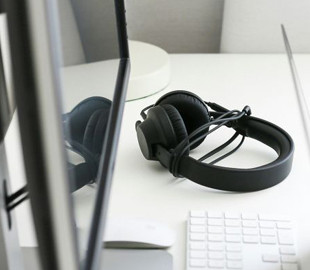
In today's world of technology, wireless headphones are becoming more and more popular. However, despite their convenience and progress, as before, there are good reasons why wired headphones retain their relevance and can never be completely replaced by their wireless counterparts.
This is written by RBC-Ukraine (project Styler) with a link to the Joy Full Lifes site.
Sound quality
The advent of aptX and LDAC codecs has greatly improved the sound quality in wireless headphones, but even then they cannot match their wired counterparts. The bandwidth of Bluetooth is insufficient to transmit lossless audio without compression, resulting in a loss of sound quality.
In contrast, wired headphones can transmit audio without compression and loss, which provides a higher level of sound detail, depending exclusively from the signal source and the quality of the audio file.
Sound transmission delays
Due to the need to decode the digital signal, buffer it and convert it to an analog format, there is a noticeable delay in the sound in all wireless headphones. It varies depending on the model from 40 to 300ms, including even the most popular AirPods Pro 2, where the delay is 126ms.
Although wired headphones also have a small delay in the range of 5-10ms, it is minimal compared to wireless analogues.
In the case of listening to music or watching videos, a small delay may not be significant, but in dynamic video games, working with sound or playing musical instruments, it becomes critically important. Because of this problem, using wireless headphones for these purposes is unfortunately impractical.
Connection instability
Wireless Bluetooth headphones experience interference due to their dependence on the radio channel. This can manifest itself in interrupted sound, connection difficulties or temporary loss of communication, especially in crowded places or in the presence of sources of interference.
Even the cheapest models of wireless headphones can experience this problem, for example, by simply placing phone in back pocket of jeans.
All these inconveniences become the inevitable price of the lack of wires. In contrast, wired headphones are free of such problems and provide a reliable connection that allows you to use them without problems in any situation.
Less compatibility
Wireless headphones can be connected only to devices equipped with a Bluetooth module, and even in such cases it is not always justified to use them.
For example, you won't be able to connect them to PCs without a Bluetooth chip, Sony PlayStation game consoles, CD receivers or guitar amplifiers. While traditional wired headphones will work in all these scenarios and many more.
The need for charging
Unlike wired headphones, wireless models are not just simple speakers, but A Bluetooth receiver, a DAC, an amplifier, and a built-in battery that powers them.
Of course, the battery requires periodic charging, and if you forget to do it in time, you can be left without music. It is also unpleasant if the headphones discharge suddenly in the middle of watching a movie or talking.
On the other hand, wired headphones do not face similar problems and do not require external power: they can be used to listen to music even for several days in a row or for long periods conversations during the working day.
Short service life and non-repairability
Due to the complex design and the large number of electronic components, Bluetooth headphones become less reliable. One of the weak points is their battery. In compact TWS models, its resource is 1-2 years, and in full-size models – up to 3-4 years. Replacing the battery is difficult and in some cases impractical, especially for miniature headphones.
In wired devices, the most vulnerable are the cable and the connector. Nevertheless, both of these elements are much more likely to be subject to repair. The simpler design also makes the wired earbuds easier to carry, allowing them to more easily withstand accidental drops and making for easier handling overall.
Risk of losing one earbud
When using compact TWS earbuds that show all the advantages of wireless technology, there is a risk of losing one of the earphones due to sudden movement or carelessness.
Due to their small size, finding a lost earphone can be difficult, and an earphone left without a pair becomes practically useless. In this case, you have to buy a spare headphone (and their cost is quite high) or buy new ones altogether.
High price
Despite the widespread use of wireless headphones and the appearance of many successful models at affordable prices, such devices will always be more expensive than flagships with comparable sound quality. This is understandable because Bluetooth headphones contain many more internal components, which increases their cost.
Wired headphones, on the other hand, have a simpler design and have generally come down in price due to competition from wireless models.< /p>

